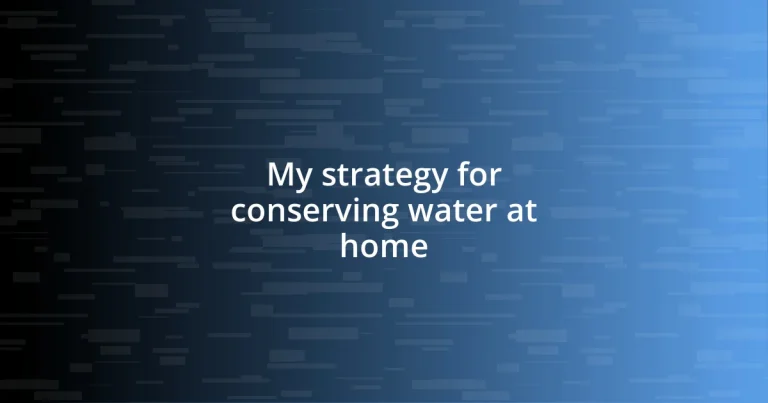Key takeaways:
- Implement simple water conservation methods, such as collecting excess water, fixing leaks, and harvesting rainwater to significantly reduce waste.
- Identify and track water usage sources in your home, making small changes like using a basin for washing dishes or installing efficient fixtures to improve water efficiency.
- Educate and engage others in water conservation efforts, sharing experiences and practices within your community to foster collective awareness and action.
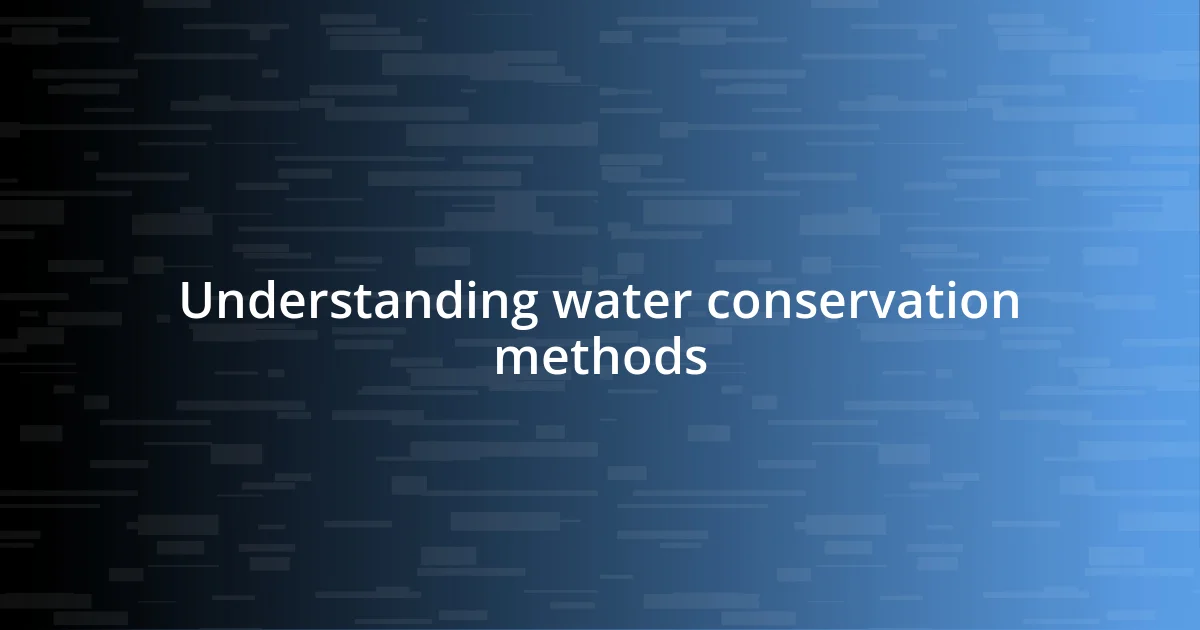
Understanding water conservation methods
Water conservation methods are diverse and can vary dramatically based on one’s lifestyle and home. For me, implementing simple changes made a significant difference; for instance, I started using a bucket to collect excess water while waiting for the shower to warm up. Have you ever thought about how much water goes down the drain during those few minutes? It’s startling!
Another method that I’ve found incredibly effective is fixing leaks promptly. I once had a faucet that dripped constantly; I didn’t realize until I calculated its waste over a week. Seeing that number shocked me! It’s a vivid reminder that small issues can lead to considerable waste if ignored, don’t you think?
Lastly, rainwater harvesting has transformed how I think about water usage. I set up a barrel to catch rainwater, which I now use for watering my garden. Not only does it feel good to reuse what nature provides, but it also deepens my connection with the environment. Have you ever tried collecting rainwater? It’s a surprisingly empowering practice!
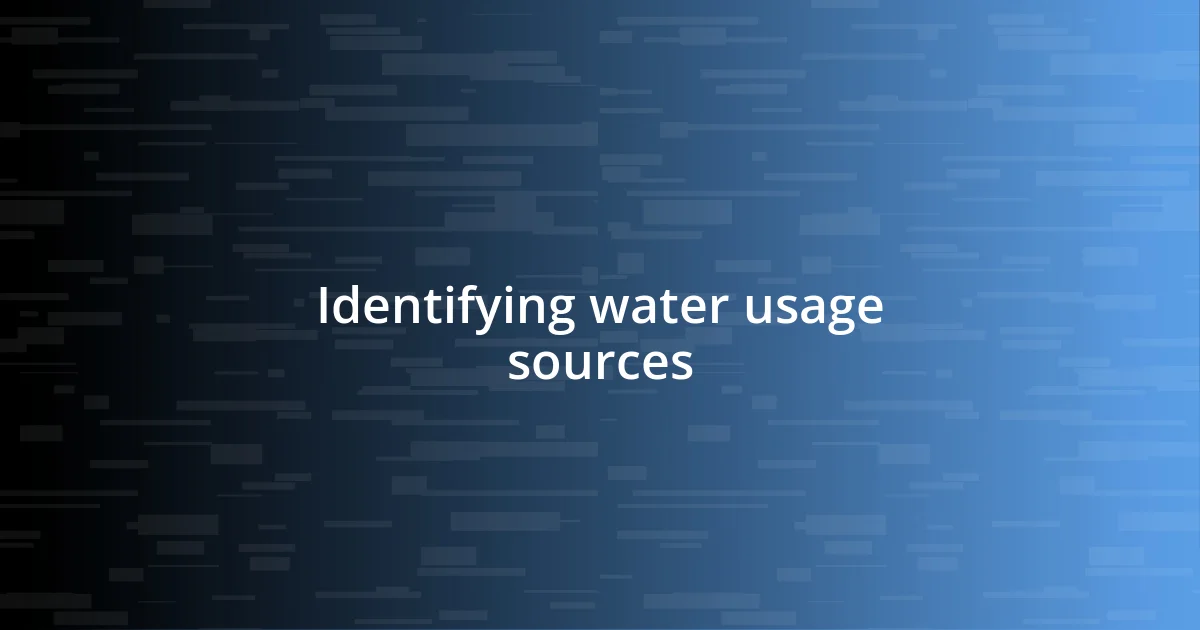
Identifying water usage sources
Identifying the sources of water usage in our homes is a crucial step toward conserving it. I embarked on a journey to track my water consumption and discovered that the bathroom accounted for a significant portion. Each flush and shower added up more than I anticipated. Have you ever stopped to consider how often those faucets and toilets truly run?
Interestingly, after inspecting my kitchen, I realized that I was also wasting water unknowingly while washing dishes. It was a simple habit to leave the tap running while scrubbing pots, which I never thought much about until I calculated the weekly usage. This small adjustment—filling a basin instead—has made a noticeable difference. It’s incredible how those little choices can cumulatively lead us to waste less water.
Moreover, outdoor usage often goes overlooked. When I assessed my garden’s watering practices, I recognized how much water was used on radiant, sunny days. I now opt for drip irrigation, which delivers water more efficiently to plants, significantly cutting down my overall consumption. Isn’t it amazing to see how such practices can help us reclaim precious resources without sacrificing our gardens’ health?
| Water Source | Estimated Weekly Usage (gallons) |
|---|---|
| Bathroom (toilet and shower) | 150 |
| Kitchen (dishes and cooking) | 70 |
| Outdoor (gardening and cleaning) | 100 |
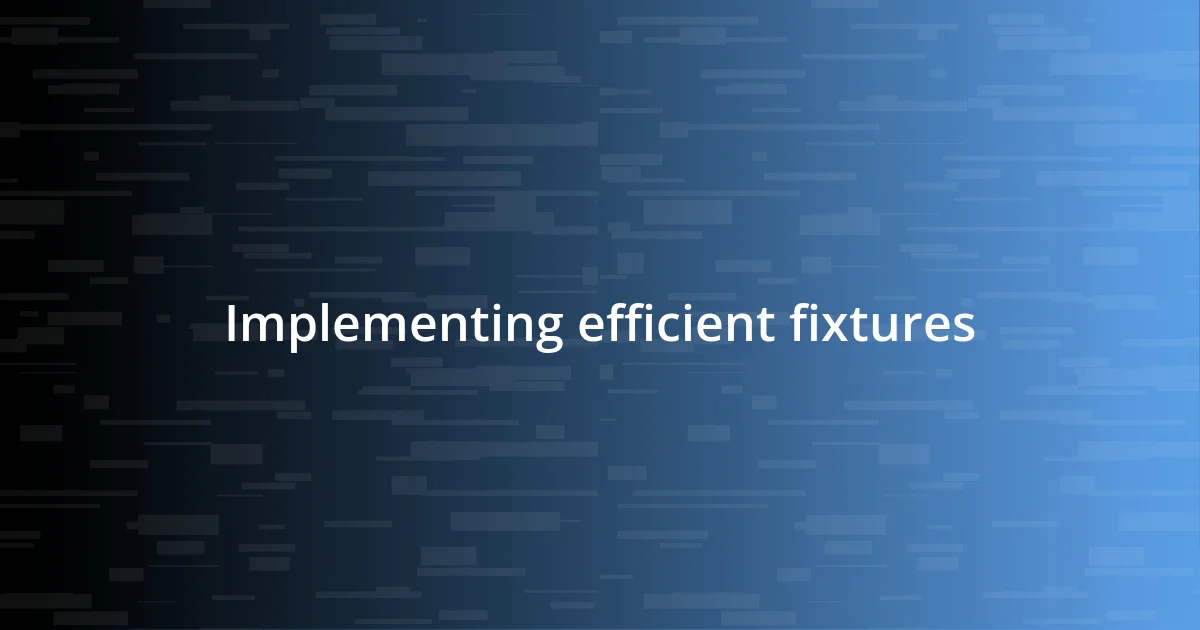
Implementing efficient fixtures
Implementing efficient fixtures in your home can radically transform your water consumption without major renovations. I remember when I switched to low-flow showerheads and faucets; the difference was immediate and pleasantly surprising. It’s fascinating how a simple fixture change can feel like you’re saving water while still enjoying a great shower experience. Have you ever noticed how satisfying a pressure-efficient shower can be?
Here’s a quick list of efficient fixtures to consider adopting in your home:
- Low-Flow Showerheads: Save water and enjoy a fulfilling shower.
- Dual-Flush Toilets: Choose the right flush to minimize water waste.
- Aerated Faucets: Reduce water flow without sacrificing pressure.
- Smart Irrigation Systems: Tailor outdoor watering as per weather conditions to prevent overwatering.
These small yet impactful changes can redefine how we experience daily routines while nurturing our planet’s health. Transitioning to efficient fixtures has not only simplified my life but has also made me more mindful of my water usage.
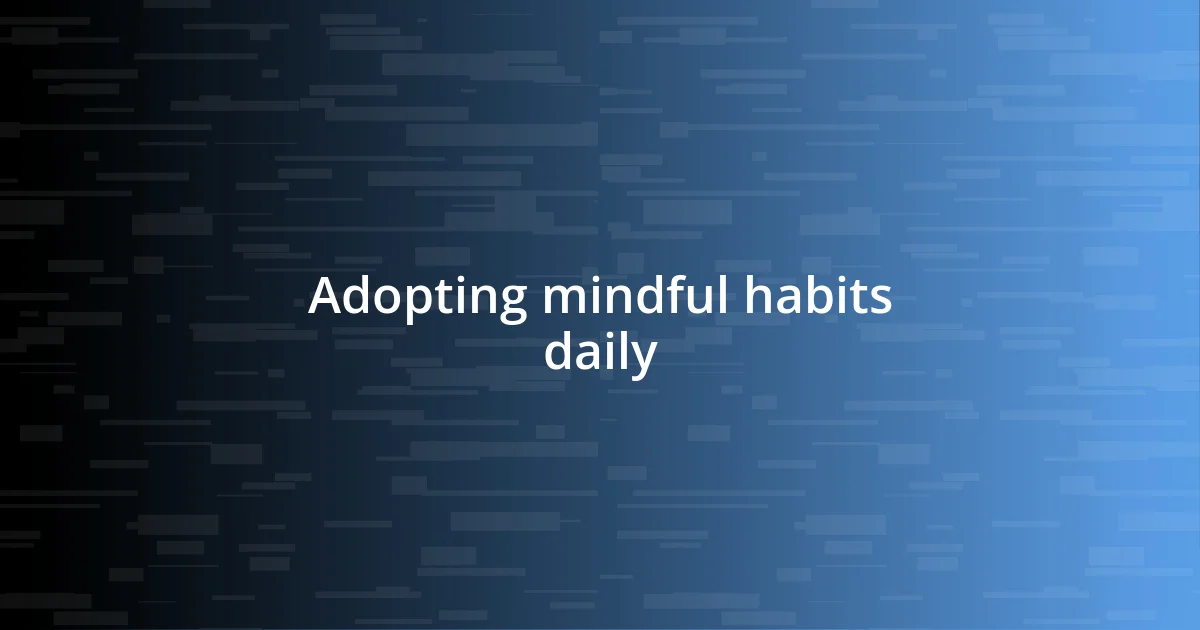
Adopting mindful habits daily
Adopting mindful habits daily can truly revolutionize how we use water at home. For instance, I consciously made it a routine to turn off the tap while brushing my teeth. At first, it felt a bit awkward, but now it’s second nature. Can you believe that this simple act has saved me nearly 10 gallons of water each week? It’s amazing how such a small effort can multiply into significant savings.
Another habit that transformed my daily life is taking shorter showers. I used to indulge in long, steaming showers, treating them almost like a spa experience. Once I started timing them, I was shocked to see how quickly those minutes added up! Reducing my shower time by just two minutes has saved hundreds of gallons a month. How often do we immerse ourselves in comfortable routines without considering their impact?
I’ve also learned to embrace the mindfulness of checking for leaks. It sounds tedious, but believe me, after discovering a dripping faucet that was wasting over 30 gallons a month, I became a firm advocate for regular checks. Each time I hear water dripping, it serves as a gentle reminder of the importance of being vigilant. How much water might be going down the drain in your own home? Taking stock can be a powerful step in conserving our most vital resource.
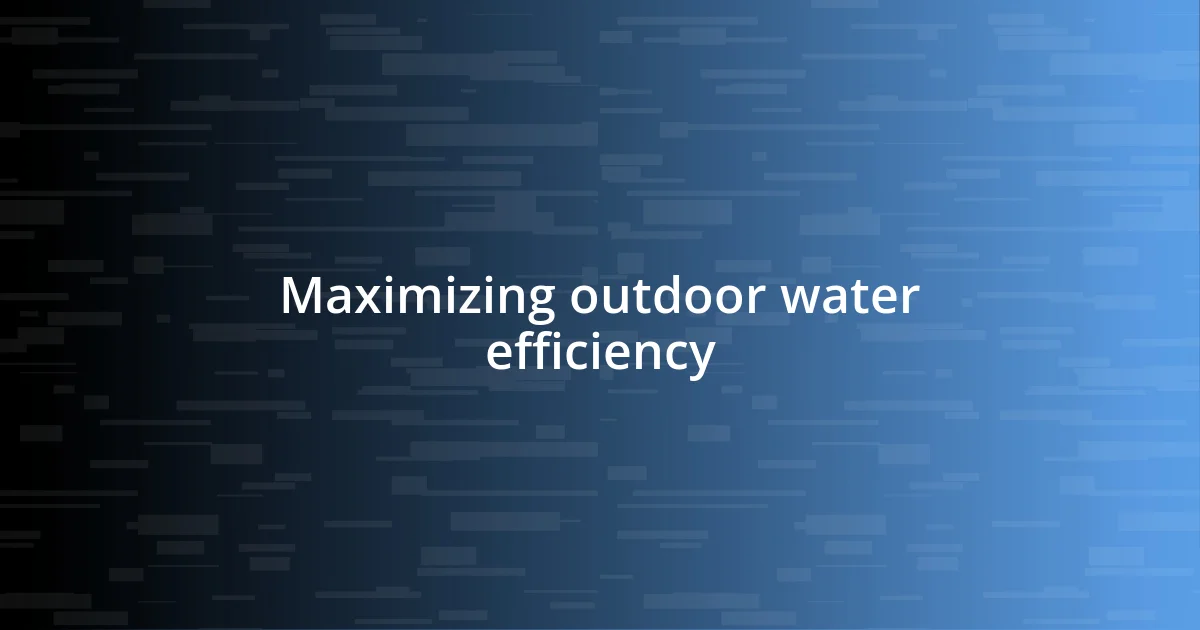
Maximizing outdoor water efficiency
To enhance outdoor water efficiency, I found that adjusting my watering schedule dramatically impacted my water usage. I used to water my garden every evening, assuming more was better. However, after learning about evaporation rates, I switched to early morning watering. Not only did my plants thrive, but I also cut my water consumption significantly. Isn’t it remarkable how timing can make such a difference?
Mulching my flower beds is another game-changer. When I first started gardening, I often saw my soil dry out quickly in the sun. Since I began applying a thick layer of organic mulch, I’ve noticed the soil retains moisture far better, reducing the need for frequent watering. Plus, it adds a lovely finished look to my garden. Have you ever tried mulching? If not, you might be surprised by the benefits.
I also embraced drought-resistant plants after my experiences with traditional landscaping. Initially, I favored vibrant, thirsty flowers, but they required constant attention and watering. One summer, during a particularly dry spell, I lost a few plants despite my efforts. That motivated me to explore native species that flourish with minimal water. The joy of seeing my garden bloom beautifully with such resilient plants has been incredibly rewarding. Have you thought about what plants might best suit your local climate?
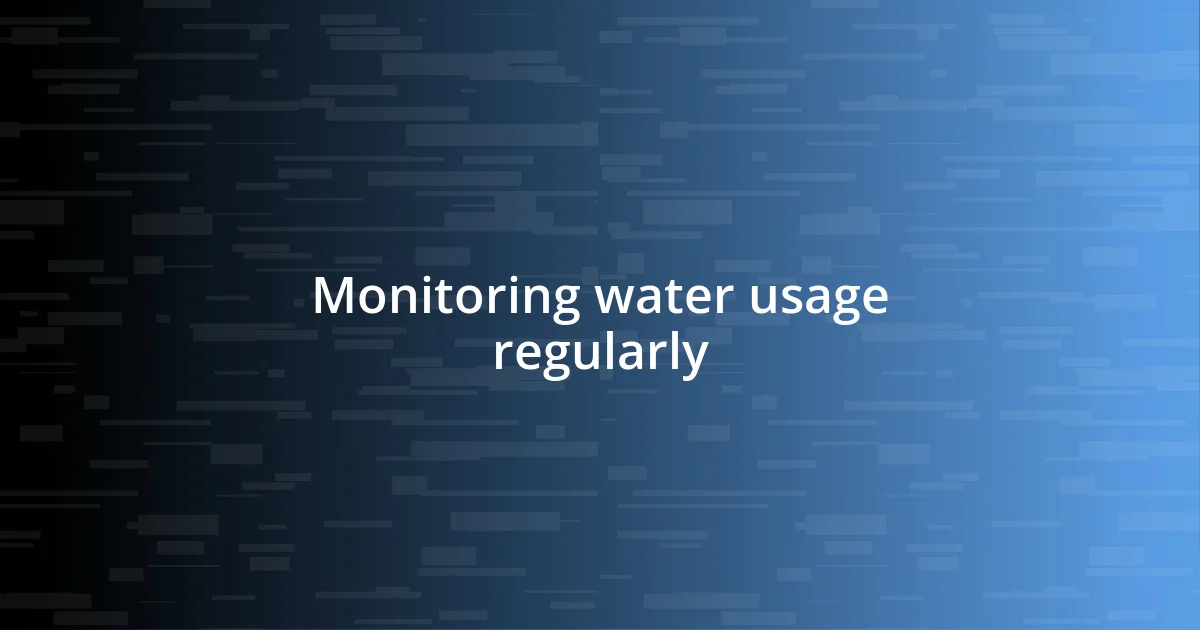
Monitoring water usage regularly
Understanding how much water I actually use has been a true eye-opener for me. I invested in a simple water meter that allows me to keep track of my daily consumption. The first week of monitoring was surprising; I realized I was using more than I thought. It made me question my habits—how often do we really know what we consume daily? This awareness ignited a commitment to reduce my usage even further.
Regularly checking my water bills has become another vital practice. When I noticed an unusual spike one month, I investigated and found my kids were leaving the hose running while playing outside. It was a frustrating discovery, but it served as a lesson for all of us. Engaging with my family about water usage sparked some meaningful conversations about our consumption patterns. Have you discussed water habits with your family?
I’ve also started keeping a journal to track my water usage changes over time. Writing down how much I use each week has become not only a practical tool but almost a personal challenge. When I see the numbers go down, it’s incredibly rewarding. Why not give this a try? I can guarantee it’ll foster accountability and encourage more mindful choices in your water use.
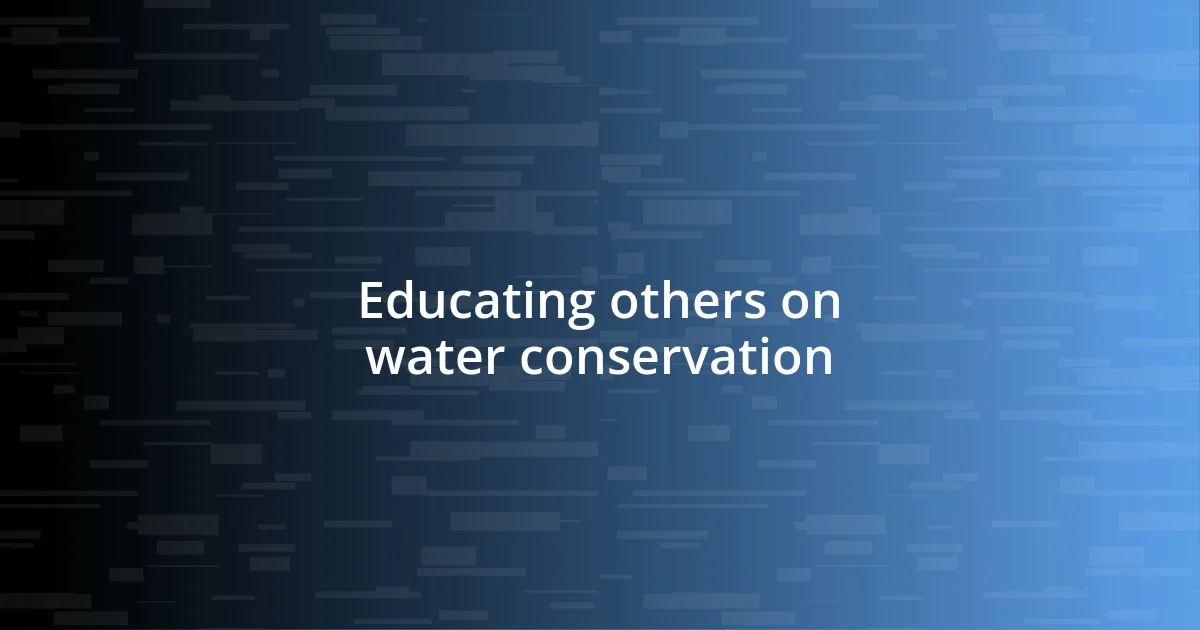
Educating others on water conservation
Educating others about water conservation is something I hold dear, and it often starts within my own home. I remember when my daughter discovered just how much water we could save by turning off the tap while brushing her teeth. We turned that realization into a fun family challenge, and now she actively reminds others to do the same. Have you ever witnessed a simple habit change inspire someone else?
When discussing water conservation, I think it’s essential to share personal experiences. I casually mentioned to my neighbors how I adapted my garden techniques, and they seemed genuinely intrigued. They even asked for tips on mulching! I led a small workshop in the community, where we exchanged ideas and strategies. It’s amazing to see the spark of interest grow into a collective commitment. Isn’t it fulfilling to be a part of something that encourages positive change?
In social circles, I often highlight the importance of small daily actions. Once, I joined a local discussion group on sustainability, and it was enlightening to hear everyone’s different perspectives. Sharing my journey reinforced the idea that water conservation isn’t just a solitary endeavor; it’s a community effort. So, what are you doing to educate others in your life? Your insight could motivate others to rethink their own habits!












